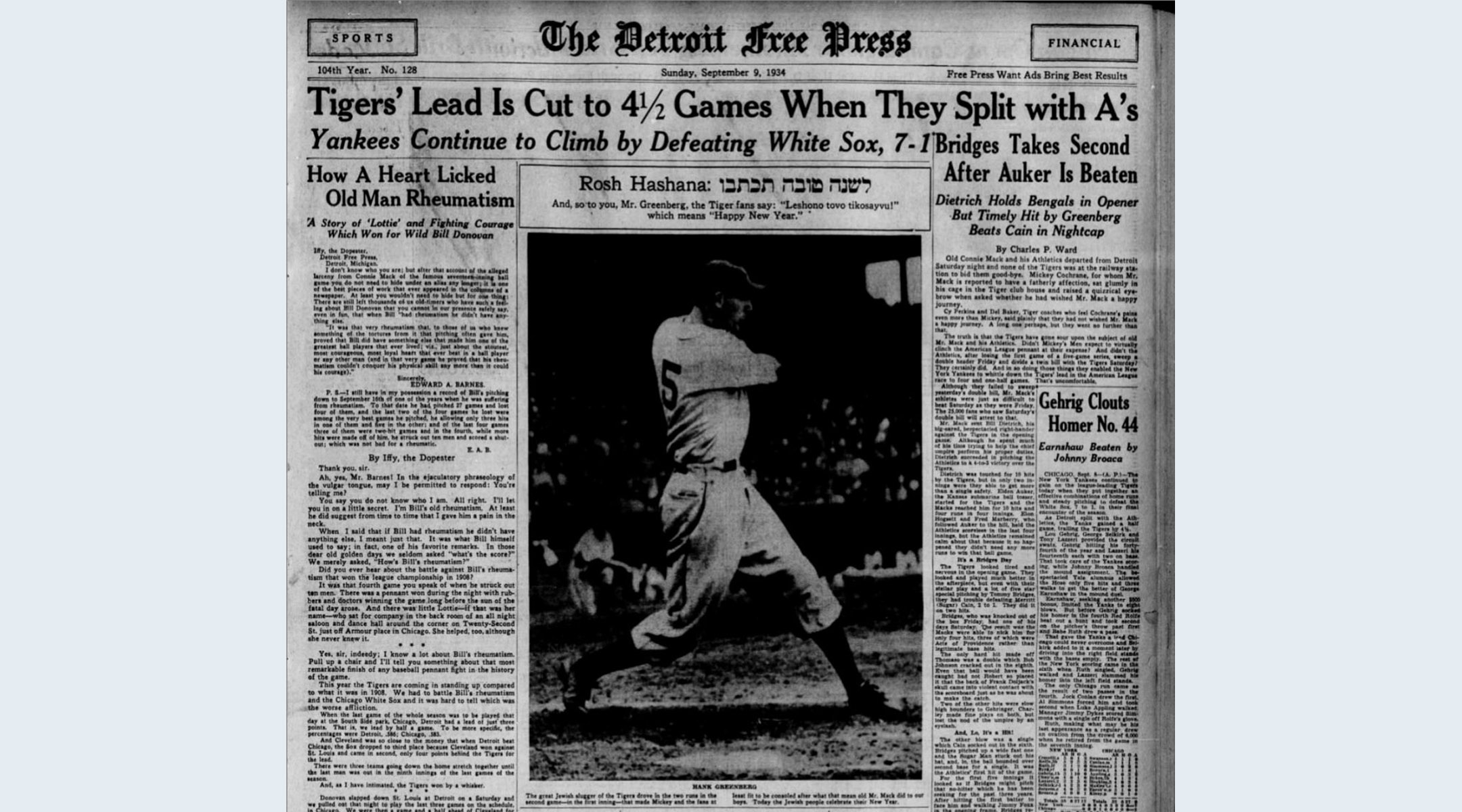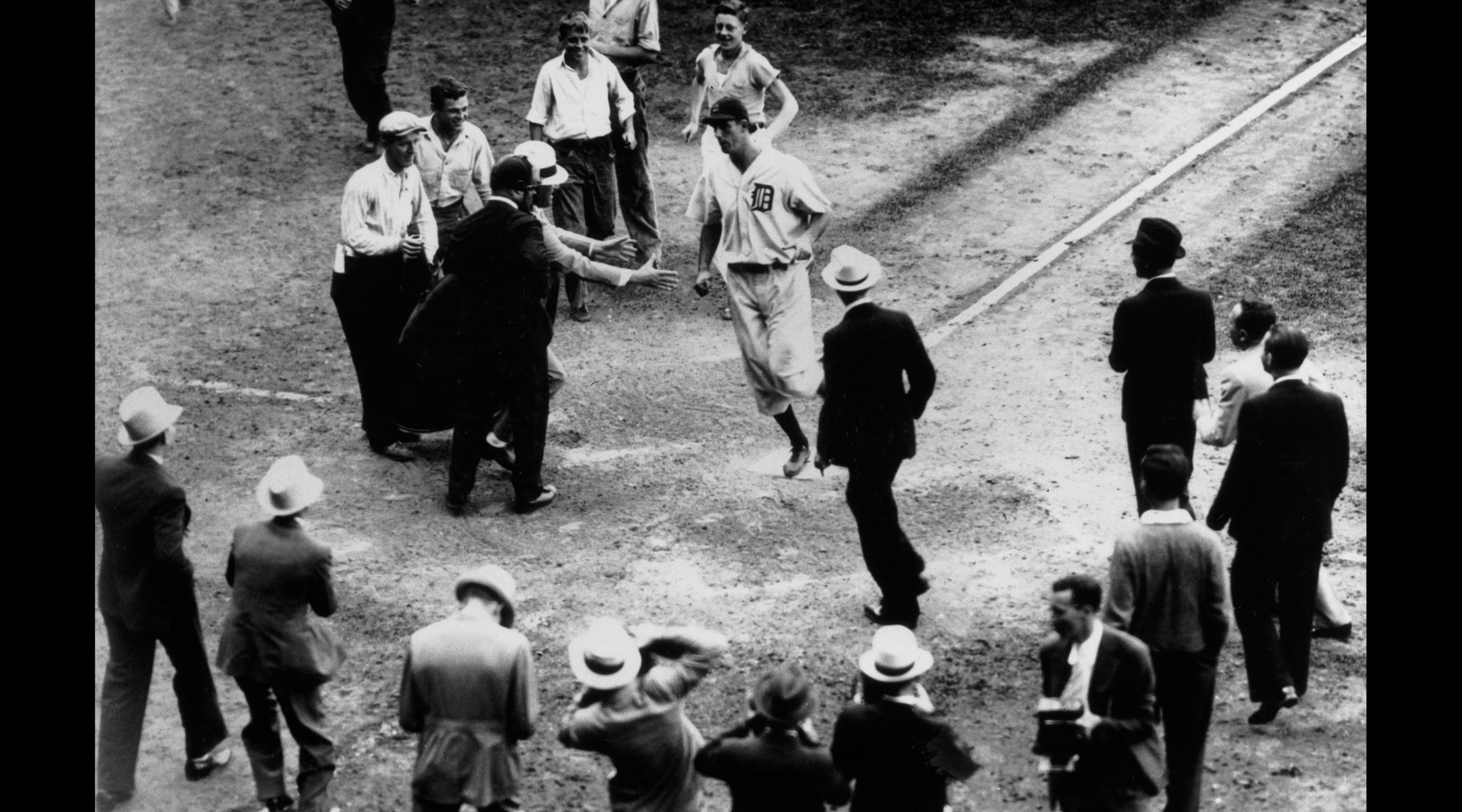(JTA) — Sandy Koufax’s decision to sit out Game 1 of the 1965 World Series because it fell on Yom Kippur is well-documented.
But in a lesser-known dramatic tale just over 30 years earlier, fellow Jewish Hall of Famer Hank Greenberg faced a dilemma of his own as the High Holidays approached.
Picture the scene: It’s Sept. 10, 1934, and Greenberg’s Detroit Tigers have a four-game lead on Babe Ruth’s New York Yankees in the pennant race. Detroit hadn’t won the pennant since 1909. Greenberg, in his second full season in the big leagues, is already one of the game’s best hitters — he’d end the season with an MLB-leading 63 doubles, the third-most ever in a single season.
The Tigers have a crucial matchup against the Boston Red Sox, but the game falls on Rosh Hashanah. Greenberg, who was raised in an Orthodox Jewish household and had quickly become an icon for Jewish fans across the country, was very torn. On the one hand, Rosh Hashanah was among the holiest days in the Jewish calendar and it felt wrong to play. On the other hand, his team needed him.
Earlier in the day, Greenberg went to Detroit’s Congregation Shaarey Zedek for services, having not decided whether he would play that night.
“I need you out there, but in the end, it’s your choice,” his coach Mickey Cochrane told him.
The previous day, Greenberg had received an unexpected message of support from the Detroit Free Press. The paper printed a photo of Greenberg on the front page of the sports section, accompanied by a large Hebrew headline with the common Rosh Hashanah greeting along with an English line: “And so to you, Mr. Greenberg, the Tiger fans say, ‘L’shana Tova Tikatevu!’ which means ‘Happy New Year.'”

The front page of the Detroit Free Press sports section on Sept. 9, 1934. (Screenshot)
“In Hebrew letters, front page, it was as if war had been declared. The type was that big,” Steve Greenberg, Hank’s son, told WBUR in 2017.
American Jewish historian Jonathan Sarna told WBUR it was likely the first example of a major U.S. newspaper using a Hebrew headline — and in 1934, when papers used metal plates for printing.
“I have no idea, to this day, where they got the metal type for this Hebrew,” said Aviva Kempner, who directed the 1998 documentary “The Life and Times of Hank Greenberg.”
The political context of the day also weighed on Greenberg. Adolf Hitler and the Nazis were rising to power in Germany and antisemitism was rampant in the United States. Detroit in particular was home to two of the 20th century’s most infamous antisemites, automobile titan Henry Ford and the radio host Father Charles Coughlin.
In the end, Greenberg played. As the Tigers took the field, Jews in Detroit took their seats for Rosh Hashanah services.
“While the cantor was singing, he would stop for a minute and say, ‘How’s Hank doing?'” Tigers fan Harold Allen recalled to WBUR. “The whole interest of the city of Detroit was Hank Greenberg.”
Detroit beat Boston 2-1, with the help of Greenberg — who hit two home runs, including a game-winner in the bottom of the ninth inning. The Tigers ultimately won the pennant but lost in the World Series to the St. Louis Cardinals.
“I hope I did the right thing,” Greenberg later said, according to the 2013 book “Hank Greenberg: The Hero of Heroes,” by John Rosengren. “Maybe I shouldn’t have played. It’s a sacred day. There wasn’t any way of getting a dispensation or anything… I got thinking about the team, and I didn’t want to lay down on the team. But it’s on my conscience.”
Nine days later, Greenberg sat out the Tigers’ regular season game on Yom Kippur.
A few days after Yom Kippur, the Detroit Free Press printed a poem, titled “Speaking of Greenberg.” It read, in part:
“Came Yom Kippur — holy fast day worldwide over to the Jew —
And Hank Greenberg to his teaching and the old tradition true
Spent the day among his people and he didn’t come to play.
Said Murphy to Mulrooney, “We shall lose the game today!”
We shall miss him on the infield and shall miss him at the bat,
But he’s true to his religion — and I honor him for that!”
A full 80 years later, on Sept. 14, 2014, the Tigers, then led by Jewish manager Brad Ausmus, held their first-ever Jewish Heritage Day, during which they honored the Hall of Fame slugger. Tigers All-Star second baseman Ian Kinsler, who would later go on to manage Team Israel in the 2023 World Baseball Classic, hit a two-run home run.
JTA has documented Jewish history in real-time for over a century. Keep our journalism strong by joining us in supporting independent, award-winning reporting.





